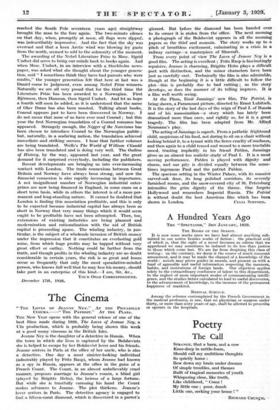The Cinema
" THE LOVES OF JEANNE NEY." AT THE PICCADILLY
CINEMA. " THE PATRIOT." AT THE PLAZA. THE New Year opens with the general release of one of the best films made during 1928, The Loves of Jeanne iley, a Ufa production, which is probably being shown this week at a good many cinemas in the British Isles.
Jeanne Ney is the daughter of a detective in Russia. When the town in which she lives is captured by the Bolshevists she is helped to escape by her Bolshevist lover and his friends. Jeanne arrives in Paris at the office of her uncle, who is also a detective. One day a most sinister-looking individual (admirably played by Fritz Rasp), whom Jeanne had known as a spy in Russia, appears at the office in the guise of a French Count. The Count, in an almost unbelievably cruel manner, proposes marriage to Jeanne's cousin, a blind girl (played by Brigitte Helm), the heiress of a large fortune. But while she is trustfully caressing his hand the Count makes advances to Jeanne. The plot thickens. Jeanne's River arrives in Paris. The detective agency is engaged to raid a fifteen-carat diamond, which is discovered in a parrot's gizzard. But before the diamond has been banded over to its owner it is Stolen from the offiee. The 'next morning
a photograph of the Bolshevist appears in all the morning papers as the thief and assassin. The story works up to a pitch of breathless excitement, culminating in a crisis in a railway carriage.---a masterpiece of fihncraft. From every point of view The Loves of Jeanne Ney is a good film. The acting is excellent ; Fritz Rasp is fascinatingly repulsive, Jeanne. is charming, Brigitte Helm plays a difficult part with distinction, and the minor characters have been just as carefully cast. Technically the film is also admirable; -though at the beginning it is a little difficult to follow the plot—this is probably due to bad cutting ; as the story develops, so does the manner of its telling improve. It is a film well worth seeing. At the Plaza, Emil Jennings' new film, The Patriot, is being shoWn, a Paramount picture, directed by Ernst Lubitsch. It is the story of the last days of the reign of Paul I. of Russia and of his assassination—a story which has lately been dramatized more than once, and rightly so, for it is a great tragedy. The film has been adapted from Mr. Alfred hleurnann's play.
The acting of Jennings is superb. From a pathetic frightened child, suspicious of his food, not daring to sit on a chair without looking behind it, to a tyrant with the fierce cruelty of madness; and then again to a child teased and wooed to a more tractable mood, trusting implicitly in his friend Pahlen, Jennings gives us an almost too realistic study of Paul I. It is a most moving performance. Fallen is played with dignity and charm, and our pity is divided equally between the some- times ingenuous Paul and the patriot Pahlen.
The spacious setting in the Winter Palace, with its massive carved-oak door, its long polished corridors, its severely furnished rooms, and the snow-covered city, of St. petersburg intensifies the grim dignity of the theme. One forgets Hollywood and remembers Imperial Russia. The Patriot is without doubt the best American film which has been






































 Previous page
Previous page